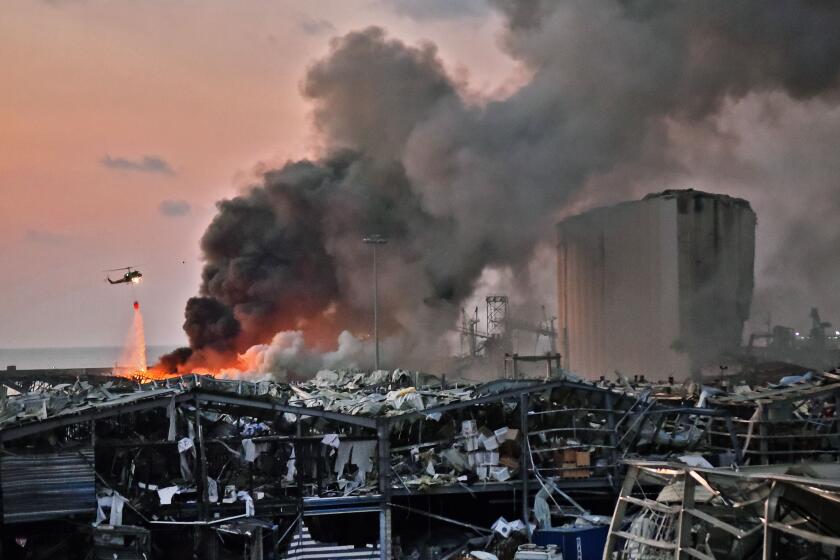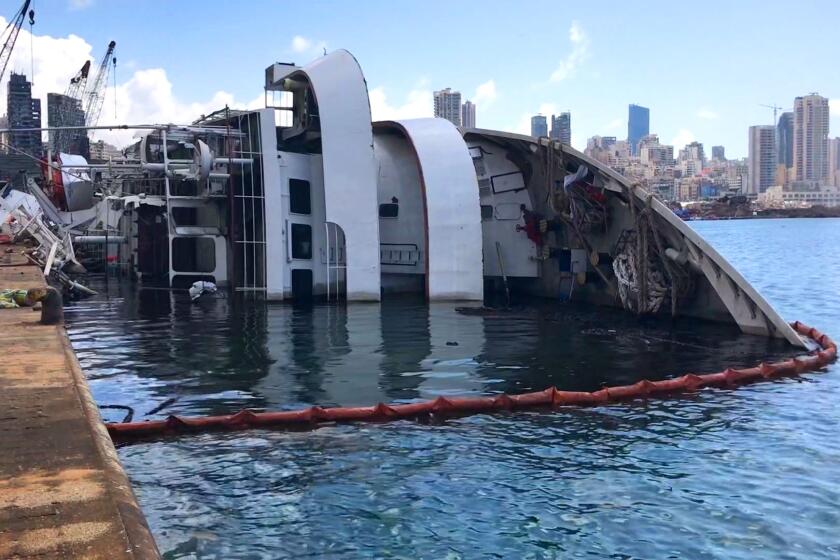Lebanon marks a bitter centennial, as French President Macron urges change

- Share via
BEIRUT — Lebanese officials facing a devastated economy, coronavirus concerns and the task of forming a new government on Tuesday took a back seat to visiting French President Emmanuel Macron during the country’s centennial.
French warplanes flew overhead with the Lebanese tricolor, and it was Macron who planted a cedar tree — the country’s emblem — in a northeastern Lebanese reserve, with no Lebanese politicians in sight.
The absence of Lebanese leaders, including President Michel Aoun, during events marking the anniversary seemed emblematic of a power vacuum within a political class that has pushed the country to the brink, made its survival for another 100 years an open question and left many people thinking favorably of the country’s colonial past under French rule.
“Many people wish they could go back to the mandate days.... ‘It’s better than the mess we have now,’ they say,” Maha Yahya, director of the Beirut-based Carnegie Middle East Center, said in a phone interview Tuesday.
“There’s a complete and utter failure of the country’s political elite. It’s not only in managing the country; they’ve gone even beyond that and outdone themselves in driving Lebanon into an abyss.”
Though Lebanon’s first century has seen turmoil (civil wars, invasions, constant internal bickering), it’s the latest calamity — when 2,755 tons of ammonium nitrate detonated in Beirut’s port in an apparent accident four weeks ago, killing at least 190 people, injuring thousands and leaving hundreds of thousands homeless — that appears to have been the key blow to the state, at least in its current form.
Hundreds of protesters congregated Tuesday in Beirut’s downtown district in what activists billed as “a day of rage.” Demonstrators engaged in pitched confrontations with security forces, using garbage bins as shields against volleys of tear gas canisters. Nearby, bands of men tried to scale barricades protecting the parliamentary headquarters.
“It’s a pivotal moment. It showed that this political system is a dead-man walking,” said Joe Macaron, a Lebanese foreign policy analyst at the Arab Center in Washington, in a phone interview Tuesday.
Los Angeles Times reporter Nabih Bulos was less than 500 yards from the center of the massive explosion in Beirut. He lived to tell the tale
With the Lebanese people’s faith in the ruling elite all but finished, foreign powers have taken on a more active role managing the country’s affairs; an echo, Macaron said, of Lebanon’s colonial past as a French protectorate. Lebanon gained its independence in 1943.
The bulk of that role has been taken up by Macron. In his first visit two days after the Aug. 4 blast, he was greeted by Lebanese who have all but given up on their rulers, with more than 61,000 people signing a petition that called for Lebanon to “go back under the French mandate in order to establish a clean and durable governance.”
Macron’s second visit to the country since the blast aims to steer political elites to accept crucial reforms; only then, he and other world leaders have said, will foreign aid be unlocked to help avert a full collapse.
Later Tuesday he met with Lebanese leaders to discuss reforms, while pledging to host an international aid conference for the country in October. Aoun tweeted that Gebran Bassil, the country’s foreign minister and a target of much of the opposition’s ire, had submitted a “salvation road map” aimed at solving Lebanon’s economic and political problems.
The crises facing Lebanon are multiple: Since last year, it has teetered on the edge of bankruptcy, with its local currency losing 80% of its value against the dollar even as it defaulted on its debt payments in March. Last month, the United Nations Economic and Social Commission for Western Asia said more than 55% of Lebanon’s 5.4 million people were “trapped in poverty and struggling for bare necessities,” an estimate based on figures from before the explosion.
In addition, the coronavirus outbreak is accelerating, with a tally of more than 17,700 confirmed cases and hundreds added every day, and about 170 deaths.
The government has stalled both in investigating the blast and helping its victims.
Restoring historic districts badly damaged in the Beirut blast will be a tall order given Lebanon’s weak economy and developers’ eagerness to move in.
If there is no change within three months, Macron said in a televised news conference at the end of his visit, he would counsel other nations to withhold aid, and his government would explore imposing sanctions on the ruling class.
“Today we cannot say we will continue working as we did in the past,” he said, adding that all parties had agreed to follow a road map aimed at saving Lebanon. “It’s not a carte blanche.”
With those warnings in mind, Lebanese politicians have raced to at least appear cooperative. On Tuesday, Ghazi Wazni, the finance minister in a caretaker government, signed contracts involving forensic audits of Lebanon’s central bank, which has been accused of engineering a scheme that benefited political cronies.
Hours before Macron’s arrival on Monday, Lebanon’s leaders designated as premier Mustapha Adib, a 48-year-old diplomat who has served since 2013 as the country’s ambassador to Germany.
Lebanon’s confessional power-sharing system mandates the prime minister be a Sunni Muslim. Though Adib was mostly unknown before his name was put forward to lead the government, he received — reportedly due to pressure from Macron — the backing of most of the parties in parliament. That included Christian parties as well as Hezbollah, the Lebanese Shiite political faction and armed group designated by the U.S. as a terrorist organization.
But there is little indication he has wider support. After his selection Monday, the premier-designate walked through blast-devastated areas of Beirut in a bid to show solidarity with victims still engaging in the torturous clean-up operations. But instead of a welcome, infuriated residents shouted “Revolution!” prompting Adib’s bodyguard detail to usher him away.
A prime demand is a full overhaul of the power-sharing system many contend is to blame for the chronic dysfunction and corruption of Lebanon’s governance. But others turned to Macron to give them an escape.
“I’m doing everything I can to emigrate. I have no hope, and nothing left to lose. This is my message to Macron,” said one protester, a young woman in her 20s who didn’t give her name because of concern for her safety. She pointed to a sign reading “Aidez moi a immigrer” — help me emigrate.
“If Macron wants to help, let him open up immigration so we can all leave this place!” shouted another demonstrator standing nearby.
Meanwhile, there is a growing fear that the French president has promised more than he can deliver; Lebanon’s bringing in Adib, who had been an aide to a former prime minister, signaled little in the way of change, Macaron said.
“The way Adib was parachuted into Lebanese political life, with supposedly French approval, shows that there’s also a disregard of Lebanese in this post-explosion, post-revolution period,” Macaron said.
Still, Yahya said, people are pinning their hopes on Macron “because they have nothing else to hope for, and don’t believe this political elite will do anything good for the country.”
More to Read
Sign up for Essential California
The most important California stories and recommendations in your inbox every morning.
You may occasionally receive promotional content from the Los Angeles Times.













